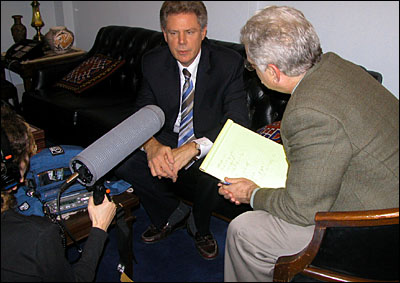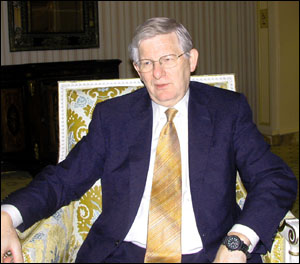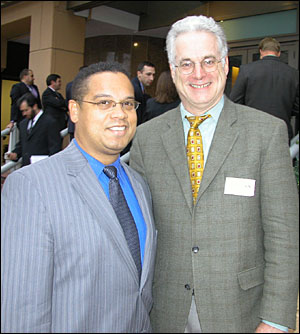 |
 | ||
 |
||
|
Part 1, 2 DERANGEMENT OF POWER?  Former Texas Democratic Representative Martin Frost defends congressional benefits. But Martin Frost isn't buying the argument that members of Congress are out of touch. Frost is a Democrat from Texas who served in the House of Representatives for 26 years. He lost after his district was redrawn during Tom Delay's controversial redistricting plan for Texas. Now Frost is a lawyer and lobbyist. Frost defends congressional benefits, such as the private gym members can use. "As I travel and visit major employers, many of them have exercise facilities for their employees," he says. "[Members of Congress] are the equivalent of major CEOs for a corporation. A lot of businesses have health facilities for all of their employees. ... If the public wants to pick out one or two things like that, you can't stop them from doing it, but members of Congress earn every penny they make and work very hard. To be able to use a gym is not unreasonable." Frost points out that many Congressional subsidies have been eliminated or cut back, like free haircuts and free gym memberships, and they don't get nearly the pay or the perks of a CEO in the private sector. "They have real responsibility for affecting public policy," he says. "Members of Congress, by and large, are intelligent, hard working and honest. There are few rotten apples in the barrel. Let's hope we find all of those and they all go to jail." Amen to that. Still, I wonder if members of Congress aren't susceptible to what business historian Richard Tedlow calls "the derangement of power." He used it to describe very successful corporate chieftains. They're surrounded by people, call them courtiers, who make sure they don't have to deal with many of the minor annoyances of life. In "Giants of Enterprise," Tedlow writes:
Members of Congress don't have to huddle on a chilly streetcorner to smoke. They can smoke inside their offices. They don't have to stand in line for stamps since they can send mail for free. Pete Sepp of the National Taxpayers Union points out that Members of Congress continue to skirt laws or rules that apply to the rest of Americans.  Representative Frank Pallone talks with Chris Farrell and Producer Sasha Aslanian "Historically it was easy for Congress to exempt itself," says Frank Pallone, a House Democrat from New Jersey. "Probably nobody paid attention since there wasn't a lot of disclosure and nobody even knew it was happening probably for the most part." Pallone points out that Congress usually promises to abide by the spirit of a law even if it's exempt from the letter of the law. But even Pallone says some exceptions are egregious. Here's one that shocked him. "In the private sector, if somebody is working for you and they go off and fight in a war, you have to reserve their place when they come back and can't decrease their salary," he says. "Well I had a guy who was in the Marine Reserves a few years ago who was about to be sent to Iraq. I went to member services, and I wanted to make sure that when he came back we reserved a place and he didn't lose his salary. And they told me that Congress exempted itself from that." Pallone shakes his head. Pallone wants to change that exemption. He also wants to change Congressional pension rules. Other public servants who violate the public trust on the job lose their pensions. Soldiers do. The same goes for cops in most states. But members of Congress don't. Remember Randy "Duke" Cunningham? He was convicted of evading taxes and conspiring to take over $2 million in bribes, including a Rolls-Royce and a yacht. But Cunningham will still get his Congressional pension. The National Taxpayers Union estimates that Cunningham will receive some $36,000 a year for his 15-year tenure on the Hill, plus cost-of-living increases. Pallone says that's not right. "If you ask anybody on the street whether they think someone who's been convicted of bribery should keep their pension, they're going to say 'No.'" No kidding. WASHINGTON: AN ISLAND SURROUNDED BY REALITY Congress has these legal perks that are pretty easy to see. But there's another major source of benefits: What about the stuff members get from lobbyists? I meet with political scientist James Thurber to talk about lobbying and the Washington favor factory at the historic Willard Hotel. It's only two blocks from the White House. This is where the practice of "lobbying" was born back in the 1860s. As the story goes, President Grant's wife didn't like his drinking at home, so he would slip out of the White House and imbibe spirits at the Willard. His drinking habit was common knowledge, and anyone wishing to get his attention would hang out in the lobby. Hence, the word "lobbyists."  The lobby of the historic Willard hotel, from which "lobbying" supposedly takes its name. The Willard is still a favorite watering hole for Washington's movers and shakers, so it seemed a fitting place to meet with Thurber. He runs American University's Center for Congressional and Presidential Studies. Thurber believes that, despite the rash of recent scandals, Washington has made progress, at least compared to the old days. In the 19th century, for instance, lobbyists put members of Congress on retainer. "It was legal," he says. "You could give them money from a steel corporation and have them do things for you on the floor of the House or Senate. That's illegal now." Nowadays there are also limits on how much wining and dining lawmakers and their staffers can accept, and strict guidelines for reporting it. Still, in Washington there are promises and then there are loopholes. Take the ban on gifts over $50. "Somehow they're sitting on the 50-yard line and the ticket only costs $49," Thurber muses. "You know that it's a lot more than that." Lobbyists want access because Congress writes the laws. Lobbying is one of the largest industries in D.C. with lots of deals negotiated over expensive steak dinners and in plush hotel suites. Thurber calculates that the actual number of individuals employed in Washington's lobbying industry totals 150,000. And the most effective lobbyists are former members of Congress and their staff. They're well-versed in what Thurber calls the law of reciprocity. You know the cliché: I scratch your back, you scratch mine. Indeed, hardly anyone with a position of power in Washington ever leaves. Instead, they take advantage of their contacts to coin money in the Imperial City.  Political Scientist James Thurber calls Washington D.C. "an island surrounded by reality," but it's also "the show" if you like politics. "No one ever wants to leave Washington," Thurber says. "We have this magnetic field around Washington. I like to say that Washington is an island surrounded by reality." Congress needs what lobbyists have in abundance: money to get reelected. Lots of money. Imagine, the average cost of winning a Senate seat in 2006 was almost $8 million, according to the Center for Responsive Politics. That means a senator needs to raise some $3,500 a day for six years just to spend the average amount on an election. Members have to raise that money without selling their influence - or looking like they are. Thurber used to teach ethics classes to new members of Congress. "I'd look out into the class and there were no members of Congress much of the time and that's the problem," he recalls. "There were staff members. Maybe one or two members were there, and they wouldn't come back for the second session. I'm a great lecturer. I don't know why they left. Maybe they felt it wasn't important?" That's no longer the case. REFORM HAS MOMENTUM  Chris Farrell poses with Minnesota freshman Representative Keith Ellison. "Times have changed!" Keith Ellison says with a laugh. He's a brand new member of Congress, a Democrat from Minnesota. Ellison says when new members began arriving in Washington this time, members from both sides of the aisle crowded into the ethics classes. "I'm digging into that and by the end of the week I'll be able to recite the rules to you." Michele Bachmann, a Republican freshman from Minnesota, agrees. "The rule book of ethics is about nine feet high, so the two days were focused on how to stay out of jail basically," she says. "I want to stay out of jail, I know that. So, what I wrote down on my pad of paper was, 'Hire a great chief of staff,' someone who knows this place, because it's not enough just to have a strong inner ethical core." A lot of reform is riding on the votes of freshman members like Ellison and Bachman. The pull of power, privilege, and perks, the lavish lifestyle of the established member of Congress, is strong. "There are always the old bulls here," warns Flake. "The so-called 'comfortable caucus' who like the job and like it as it is and whether they're in the minority or in the majority as long as they can continue in the job, they'll take it." Still, most members of Congress will pay attention to voter discontent with Congressional ethics. That's what Dick Armey thinks. The former Republican majority leader believes the last election was just the shock therapy Washington needs. "I would argue that the Democrats are not likely to soon forget the lessons they learned in '94," says Armey. "And they have a resolve to clean this place up. And I think they will do a fairly decent job and I suspect it will hold up for awhile. But eventually, sooner or later, if they live with an uninterrupted majority for too long with all the temptations that fall in your face in that town, they're going to have people who are going to get their fingers in the till, going into business for themselves." And if they do, there's always the power of an election. Yet hurrying past those free parking spots at Reagan National Airport on my way back home, I couldn't help but wonder. What if members of Congress didn't get those good pensions or that premium health care plan? Would things be different for the rest of us? Would a less imperial Washington care more about the half of the American workforce with no pension? Would a less-privileged Congress care that 16 percent of Americans, many of them children, go without health insurance? I think they might. I really do. Back to Imperial Washington |
||